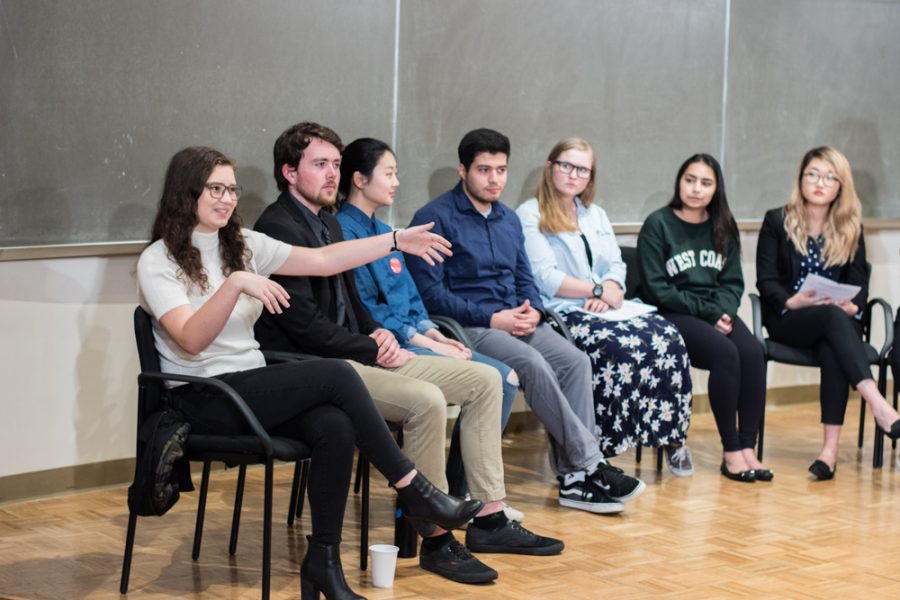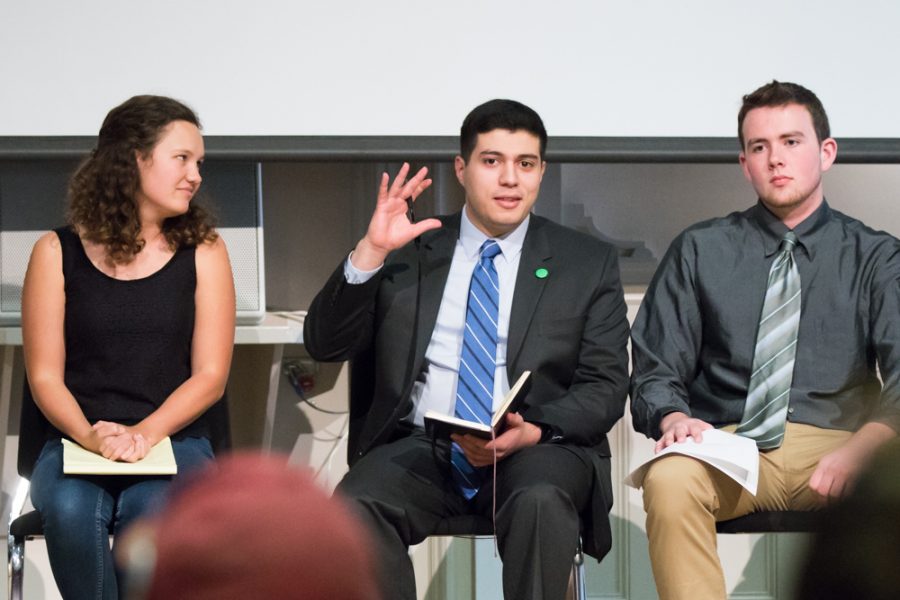Illustration by Sophie Cooper-Ellis.
From Nov. 5 to Nov. 7, Whitman’s Board of Trustees will convene for their fall meeting. While the Board holds ultimate power over the college, students do not have voice or vote on the board. But after years of requests from ASWC for greater representation, in 2013 the Board of Trustees agreed to allow a larger number of student representatives to sit on Governing Board Committees which advise the Board of Trustees. November’s meeting will reflect the start of the second year with expanded student participation on committees.
Student representatives on governing boards play an important role on campus, providing students’ perspectives and advocating for student values to Board members who make the final decisions about how the college in run. However, without a direct voice when the full board meets to make decisions, student representatives are at times left unsure of when their ideas are having an impact on the trustees.
“It’s hard without being with the Board of Trustees when the decisions are actually being made to know how much those student perspectives are taken into account, because even if the decision that is made is different from what students are asking for, we can’t use that as evidence that they didn’t listen to students,” says ASWC President Tatiana Kaehler, who serves on the Student Life Committee this year and served on the President’s Budgetary Advisory Committee from fall 2012 to spring 2013.
Student representatives gain their position one of two ways. The majority of selected representatives, however, are picked through a rigorous application process. After submitting a cover letter, resume and answering written questions for the ASWC Nominations Committee, a smaller pool of applicants are invited back for interviews with the Nominations Committee. From this group, the Nominations Committee selects a candidate they believe will serve students well, and submits their name for ASWC approval.
“Our goal in selecting [student liaisons] is to make sure that they can represent students very well. So we want people who are articulate and who are comfortable speaking to a wide variety of students,” said ASWC Nominations Chair George Felton.
A small portion of positions are automatically filled by specific ASWC officials. For example, the ASWC finance chair is always on the Budgetary Advisory Committee. Other ASWC officials are also granted optional seats on governing boards, which operate separately from normal seats in that they do not detract from the number of positions available to other students; for example, the AWSC president and vice president are allowed to join Student Life Committee if they choose.
Currently there are a minimum of 14 total positions available on seven different Governing Board Committees. In spring of 2013, then-ASWC President Kayvon Behroozian reached an agreement with the Board of Trustees to increase the number of students on each committee from one to two . Since this increase, the Nominations Committee has attempted to reflect a range of student ages, to stagger the graduation of representatives and avoid having too many leave the college at once.
“The Nomination Committee also tries to balance out years … almost all [Governing Board committees] you’ll notice that [students on committees] have varying years so there’s at least one person that stays on and can help another person understand what the process is like,” said junior ASWC Club Director Allison Kelly, who served on the Nominations Committee in prior years and is currently on the Academic Affairs Committee.
Students who apply for Governing Board committees have different motivations for doing so, but a common interest expressed by many representatives is learning more about the college’s governing process and the board itself.
“I wanted to be on the committee in general to find a way to be more involved with the governing processes on campus and to see how decisions are made in this college. I think it’s easy to imagine the governing board as this lofty panel of higher-ups sending down mandates from above, but now that I’ve been on [a committee] I know that’s not quite true,” said junior Brenna Feeney, who serves as a representative on the Student Life Committee.
Once on a Governing Board committee, student representatives are required to attend meetings when the committees convene prior to full Board of Trustee meetings in November, February and late April or early May. Although roles vary by committee, common responsibilities for student representatives are giving presentations and engaging in deliberations in their committees, where they try to express student values and make committee members’ aware of the real effect of their decisions.
“I think we’re the ones who are usually the most useful to bring the conversation back to ‘These are really students here, and in fact this … affects me and you need to listen to us as students because we are the ones that this is affecting,'” said senior Evan Griffis, a Diversity Committee representative.
A wide majority of student representatives note how attentive Trustees and other members of the committees are to student opinions and how they actively ask them for input.
“I have been pleased to find that the committee is very interested in hearing a student perspective on the college’s academic program,” said Student Life liaison Grace McMurchie in an email with The Pioneer. “Often, the committee chair turns to [fellow student liaison Allison Kelly] and I and asks for our perspective before we have even volunteered.”
At the same time, many student representatives are conscious of the fact that there is a distinction between the committee being receptive to their thoughts as student representatives and students having an ability to directly sway outcomes of the committee.
“I feel like student’s voices are taken very seriously. It’s not like we’re dismissed … but it’s not the most important priority,” said junior Noah Stern, a Budget Committee member. “I don’t think I could make a huge change in the direction of Whitman’s budget if I wanted to.”
However, while immediate effects may not be possible, student liaisons can still indirectly influence outcomes by persuading board members to take action via their advocacy in meetings. In line with this thinking, some students on Governing Board committees would like feedback about which statements and how those statements are leading to tangible decisions by the Board of Trustees in order to improve their efficacy in future meetings.
“I think it would be really good to inform students on [committees] that their input actually does factor into the decision process and how … our input actually impacts those decisions,” said junior Jack Percival, who serves as a representative on the Enrollment Committee.
Another option that has been considered to improve student input into governing outcomes is the idea of placing a “student trustee” with a vote directly on the Board of Trustees, as most recently requested in a student referendum from May 2014. However, some students point out that the main goal of having this position, namely providing a student voice at the full-Board level, is served with student representatives on committees who also interact with Board members on those committees.
“The purpose of having the … student vote is so that the Board of Trustees know how the students think. But that symbolism is shown in the exact same way, and perhaps more effectively, when you have multiple students sitting in on meetings and telling them … what they think as opposed to showing through a single vote what they think,” said Kelly.
Because no student has been placed on the Board of Trustees, student representatives on Governing Board committees will remain the major avenue for students to reflect their interests and values. As many of these student representatives note, simply having those voices goes a long way towards making the Board of Trustees aware of the full scope of student concerns, even if it eventually comes down to the Board having to make the decision they think is best for the college.
“That’s my philosophy with the governing boards –– we have students in those rooms, we have students voicing their opinions and I trust the Trustees to take those student perspectives into account,” said Kaehler.















